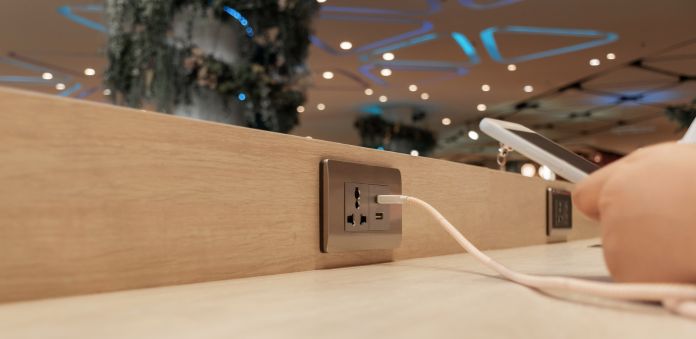Do you charge your cell phone using public charging stations? You may want to rethink that, according to the FBI. “Juice Jacking” is spreading quickly.
“Avoid using free charging stations in airports, hotels or shopping centers,” the FBI tweet read recently. “Bad actors have figured out ways to use public USB ports to introduce malware and monitoring software onto devices.” Instead, they write you should “carry your own charger and USB cord and use an electrical outlet instead.”
Hacking Expert Weighs In
Bryan Seely, a white hat hacker said that bad actors can access banking apps, contact information, emails, and text messages in minutes via “juice jacking.” He added that, with all that, it wouldn’t take long for hackers to scam one of your contacts.
They do this by “spoofing your number, calling as you, and getting even more information about you. Steal your identity. Empty your accounts.” This particular spyware can reportedly continue to track the victim even after they have unplugged from the charger.
What to do Instead
This type of malware can be quickly installed onto your phone without ever alerting you to its presence there. “That’s the danger,” Seely said. “Never, ever, ever use public chargers.” Instead, make sure you have your own USB cord and a block to plug into an electrical outlet. FBI warnings and travel alerts should be taken seriously.
If you’re in a bind and need to give your phone some juice, you can purchase a device for under $10 called a “data blocker” which will protect your data when using a public charging port.
It is notable, however, that iPhones and iPads are generally more secure against juice-jacking attacks than Android smartphones and other devices.
How To Tell If Your Phone Has Been Juice Jacked?
When you plug your phone into a computer device or any other digital device via a USB connector, a message will pop up asking you, “Do you trust this computer.” When you get this message you have the option of declining it. It indicates that the station is safe to use.
You’ll know it’s not safe when charging simply starts without any message popping up. Your device is at risk. We suggest that you then unplug and inform others that it’s not safe.
To know if your device has already been hacked look for:
- Frequent spam popups
- Charge drains more rapidly than usual
- Unknown apps suddenly appearing on your device
- Personal accounts start acting strange
- Random messages or calls you don’t recognize
As always travel smart, travel safely and be sure and stay up to speed on all the hot spots and sweet destinations in Florida.
Return to Travel Hop regularly for all the latest travel news and updates.



